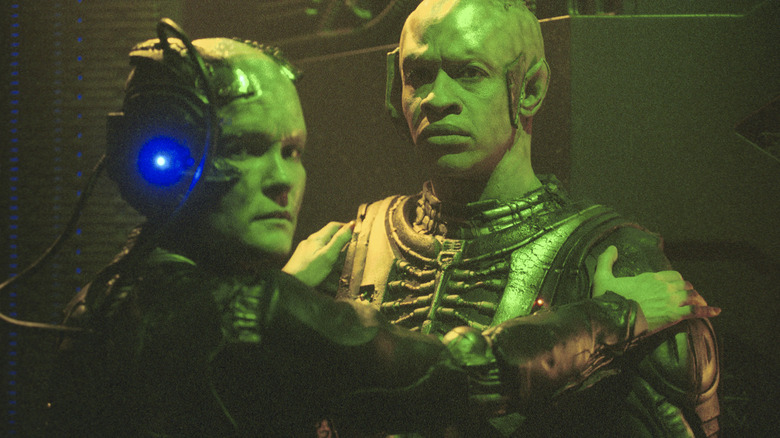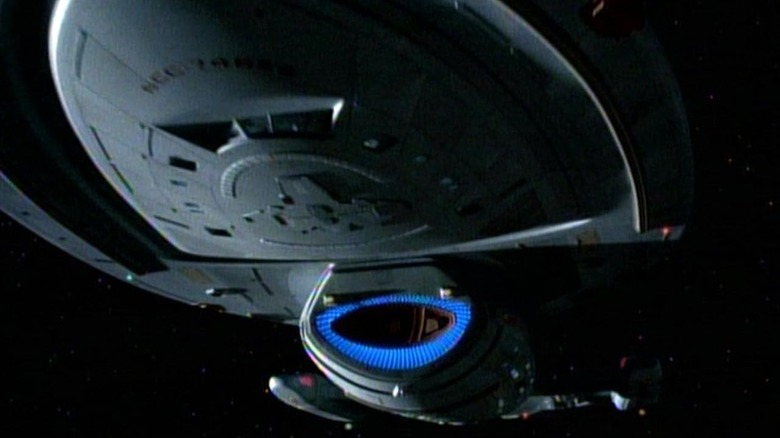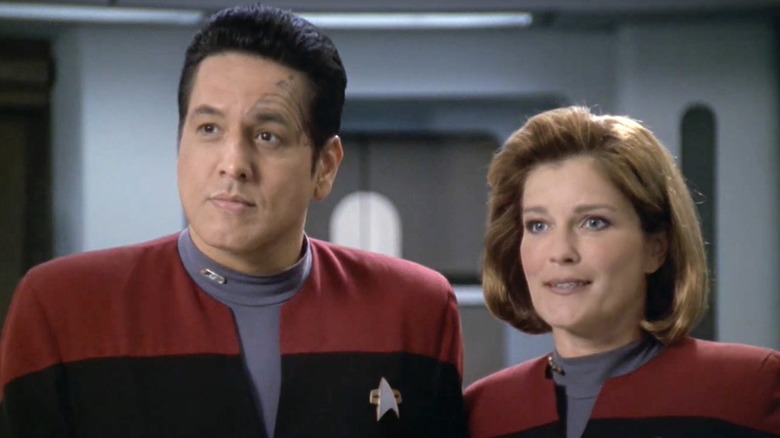Why One Of Star Trek's Most Respected Writers Walked Away From Voyager
Fans of "Star Trek: The Next Generation" always got a little giddy when Brannon Braga's name appeared in an episode's writing credits. Braga became a staff writer on TNG in its fourth season, right when the show was getting great. Braga was often the one responsible for the weirder, more psychedelic episodes of the show, starting with "Identity Crisis," a 1991 episode wherein Geordi La Forge (LeVar Burton) transformed into an invisible alien.
Braga proceeded to write the episode wherein multiple clones of Data (Brent Spiner) took over an Old West town. He wrote the episode wherein the Enterprise was caught in a time loop and didn't notice until several go-throughs of being destroyed. He wrote the one where Riker (Jonathan Frakes) woke up in an alien asylum, convinced the Enterprise was a hallucination. He wrote the one where Barclay (Dwight Schultz) devolved into a spider and the one where Data started having nightmares. Fans liked Braga.
When it came time to make "Star Trek: Voyager," Braga was all-in, starting on screenplays right away and eventually becoming one of the show's executive producers. He is credited in some capacity as a producer on 167 episodes of "Voyager," and famously began dating one of its stars. Much of the tone of "Voyager" was dictated by Braga, and his story ideas upheld the franchise at large. His career on Trek was important, long, and lucrative.
But, it seems, after four seasons of "Next Generation" and seven seasons of "Voayger," Braga began feeling a little worn down. In the oral history book "The Fifty-Year Mission: The Next 25 Years: From The Next Generation to J. J. Abrams," edited by Mark A. Altman and Edward Gross, the writer admitted to having "Star Trek" burnout. It would take the convincing of executive producer Rick Berman to talk him into writing for "Enterprise."
Fresh blood
Braga, it should be noted, is one of the co-creators of "Enterprise," so his vacation from "Star Trek" didn't last terribly long — "Voyager" ended in May of 2000, "Enterprise" debuted in September of 2001 — but a vacation was taken. Braga knew that young upstarts and fresh ideas were required to keep the franchise fresh and, well, he simply didn't have those ideas anymore. He said:
"'Star Trek' always needs fresh blood. I left before 'Enterprise;' I just said, 'I can't do this anymore.' I remember where I was and what I was working on and where I was standing and at what point in time when I officially burnt out on 'Star Trek.' I decided not to do the seventh season of 'Voyager' and then I was asked to create 'Enterprise.' Rick had a really cool idea for it and I said, 'You know what? I'm going to do this one more time.' One could argue maybe I shouldn't have. Rick was a really good overlord, but even he needed fresh writers. One could argue maybe we both should have left earlier."
Braga's dismissive language regarding "Enterprise" stems from the show's overall low popularity. Ratings were always an issue with "Enterprise," a show set a century before the events of the original "Star Trek" series, and post-9/11 audiences weren't in the mood for Trek's optimism. Unlike NextGen and "Voyager," which ran seven seasons each, "Enterprise" was canceled after only four. Braga seems to feel that having the exact same creative team behind yet another "Star Trek" series perhaps harmed "Enterprise."
But Braga, when looking back, loved working on "Enterprise." He said he couldn't bear to write another story set in the 24th century, but the 22nd was appealing.
The best of times, getting from there to here
About "Enterprise," Braga was only complimentary of the show and of Berman, saying:
"Rick does not get nearly enough credit as a writer. Some of my happiest times on 'Star Trek' were in those 'Enterprise' years. I was so fortunate that I had writing partners like Ron Moore or Joe Menosky or, after 'Star Trek,' David Goyer. I've just been blessed in that regard. Suddenly, I was writing with Rick and I didn't know what it would be like to write the pilot with him, but as it turned out some of my happiest days were sitting in his office writing the script together. It was a delightful experience. I usually had a lot of fun creating the show."
Whether one loves it or hates it, "Enterprise" had an entirely different tone than the previous three "Star Trek" shows (Braga did not work on "Star Trek: Deep Space Nine"), and one can see the showrunners working hard to make it new and striking. Braga's only complaint? Too many studio notes. It seems that Paramount wasn't fond of the "prequel" idea. But then, what professional writer doesn't hate studio notes? Braga said:
"The biggest challenge was that the studio wanted something, but they were dubious about the prequel idea when we went in to pitch it. I don't think they liked it very much. And they thought 'Star Trek' should be about moving forward and not moving backward."
After "Star Trek," Braga wrote for "24," "Salem," "The Orville," and several other series. He may be one of the more notable sci-fi writers of his generation. He was also wise enough to know when "Star Trek" had become too much.


